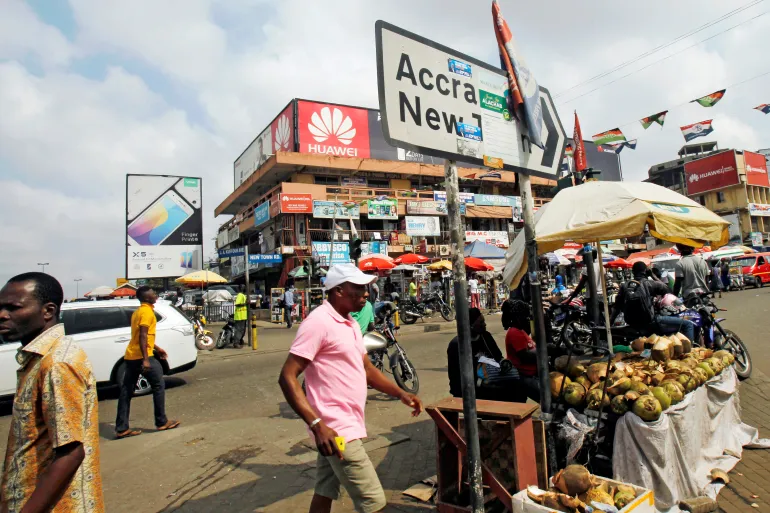- Despite Ghana’s economic woes, Fitch Solutions maintains a 2.9 per cent GDP growth for 2023. The IMF and the World Bank project growth rates below 2.0 per cent.
- The IMF estimates that public debt will remain at 87.8 per cent of GDP in 2023 and 89.2 per cent of GDP in 2024
- Ghana can enhance downstream value-added activities, stabilise petroleum prices, create jobs in the refining industry.
Ghana, previously known as one of Africa’s fastest-growing economies, has encountered obstacles to its growth trajectory due to the economic downturn caused by falling oil prices and the Covid-19 pandemic. This trend has continued to evolve, with economic growth slowing down to 3.6 per cent of GDP in 2022 amidst the global economic shock resulting from the Russia-Ukraine war.
The International Monetary Fund (IMF) estimates that GDP growth is expected to further decrease to 2.8 percent in 2023 before rebounding to 3.9 percent GDP in 2024. Several factors, including lower oil prices and production levels, fiscal and debt vulnerabilities, and a challenging external environment, will hinder growth prospects.
Future projections
Despite the challenges faced by Ghana’s economy, Fitch Solutions maintains its forecast of a 2.9 per cent GDP growth rate for 2023, even as the IMF and the World Bank project growth rates below 2.0 per cent. This predicted growth rate remains below the five-year pre-pandemic average of 5.3 per cent.
Fitch Solutions emphasizes that fiscal austerity measures will dampen private consumption throughout 2023, casting a shadow on economic growth prospects.
The introduction of new taxes as part of the IMF program is expected to put downward pressure on purchasing power, further weakening the outlook for private consumption. Furthermore, the rise in taxes is anticipated to slow down the pace of disinflation in the coming quarters.
Although a more stable exchange rate and moderating global commodity prices may lead to a moderation in price growth, inflation is projected to remain stubbornly high due to tax increases resulting in upward adjustments to consumer prices.
Fitch Solutions forecasts a real GDP growth rate of 3.7 per cent in 2024, indicating some acceleration. However, it will still fall short of the five-year pre-pandemic average of 5.3 per cent.
In 2022, real GDP growth reached 3.7 per cent year-on-year in the fourth quarter, surpassing consensus expectations. The growth was driven by robust growth in the mining and ICT sectors while the manufacturing and real estate sectors experienced poor performance due to high inflation and contractionary monetary policy. The full-year growth for 2022 came in at 3.6 per cent year-on-year, highlighting the slowdown compared to previous years.
Addressing high public debt
To address the issue of high public debt, talks have been initiated with Paris Club members regarding external debt restructuring. The IMF estimates that public debt will remain high at 87.8 per cent of GDP in 2023 and 89.2 per cent of GDP in 2024.
The Ghanaian authorities have committed to an extensive economic reform programme that builds upon IMF-led Post-Covid-19 Program for Economic Growth. Furthermore, the government remains dedicated to the Energy Sector Recovery Programme (2019-2023) in collaboration with the World Bank.
Promoting local gold mining sector
To maximise the benefits of gold mining, Ghana should prioritise local participation to retain more earnings. This could involve granting more licenses and concessions to local miners, and simplifying the licensing process. This could also involve providing support and resources for small-scale miners to operate legally and responsibly.
Ghana should work towards formalising the small-scale mining sector, which currently operates largely informally. This can be achieved by implementing stricter regulations and enforcement mechanisms to curb illegal mining. At the same time, providing support and incentives for artisanal miners to operate legally could help.
Efforts should also be made to address the underlying social and economic issues that drive people to participate in informal mining.
Establishing a domestic oil refinery
Investing in a domestic oil refinery would help Ghana reduce its dependence on imported petroleum products. By setting up additional refineries, Ghana can enhance downstream value-added activities, and stabilise petroleum prices. The initiative will also create jobs in the refining industry, and promote growth through value addition.
The government needs to exercise fiscal discipline, cut unnecessary expenses, and improve efficiency in public spending. By reducing borrowing and addressing fiscal imbalances, the government can restore macroeconomic stability. It can also improve investor confidence, and explore strategies to increase revenue generation through diversification, tax reforms, and attracting investments in non-extractive sectors.
Prioritising energy efficiency measures, particularly in the refining and industrial sectors, can reduce production costs and promote economic growth. Additionally, investments in infrastructure development, including road networks, will improve connectivity and facilitate economic activities across the country.
Collaboration with global partners
Ghana can seek support and collaboration with international organisations like the IMF and World Bank to address its economic challenges. This could involve the ongoing debt restructuring programs, financial assistance, and technical expertise to implement effective economic reforms. Collaborative efforts can help Ghana navigate its economic recovery path and achieve sustainable growth.
Implementing these policies will require careful planning, stakeholder engagement, and a long-term commitment from the government. Addressing structural issues and promoting inclusive growth should be at the forefront of Ghana’s economic turnaround policies.
Despite the challenges, Ghana has the potential to overcome these obstacles and achieve sustainable and inclusive economic growth.
